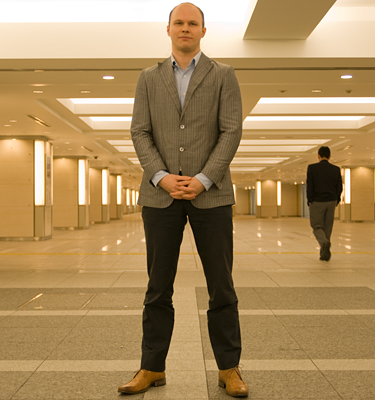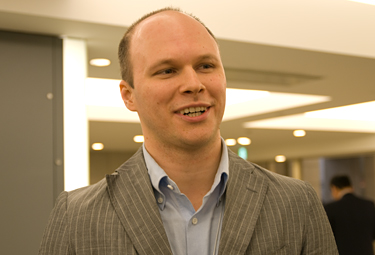
Posted: Mon Mar 01 2010
Pasha Alpeyev, Journalist
What brings you to Marunouchi?
PA: Our office is in the Marunouchi Building. I’m on my lunch break.
What are your working hours like?
PA: About 8am to 7pm. I write financial articles.
Do you also hang out in Marunouchi after work?
PA: I go to other places, like Aoyama, Shibuya and Ebisu. I fell in love with Ebisu the first time I went there; that’s where I live.
What made you fall in love with Ebisu?
PA: Each area has is its own unique character – Roppongi is great for partying, Shinjuku is more formal and Shibuya is young and fashionable. But Ebisu is great for everything. It has both character and a wealth of great restaurants as well. Plus, it‘s close to Daikanyama, Hiroo and Meguro. Lots of areas in Tokyo stop after the last train, however, Ebisu keeps on going into its own unique little world. I’ve been here after the last train and can tell you that it’s still lively; it has its own source of energy.
What brought you to Japan?
PA: I was inspired to come here after reading ‘Death in Summer’ by Yukio Mishima. I studied East Asia at university, majoring in Chinese. I’d spent six months studying in China and was really keen to go back there. However, after reading Mishima’s book, which a friend recommended, I was really taken aback. I remember just thinking ‘wow’. I’d been curious about Japan before but… After that, I read a whole host of books by authors such as Haruki Murakami, Oe Kenzaburo and Kobo Abe.
Haruki Murakami, Oe Kenzaburo and Kobo Abe are all a bit deep right?
PA: Kobo Abe is relatively easy to understand for people born in the Soviet Union. I was born in the Ukraine. The emotions that the key characters feel in his stories are similar to those felt by people in the Soviet Union, which if anything, rather than seeming exotic, makes them too easy to understand. After reading these books, I felt that I had to come to Japan.
When did you come to Japan?
PA: Eight years ago. To begin with, I taught English in Kyushu. As long it wasn’t Tokyo I didn’t mind where I went. Foreigners tend to gather in Tokyo, or more specifically, in Minato-ku. [Laughs] Spending two and a half years teaching English in Kokura, in Kyushu, was great.
Why did you leave Kyushu and come to Tokyo?
PA: I felt that to do something other than teach English I needed to come to Tokyo. Journalism is great. I’m full of curiosity and love finding things out. In journalism there’s no limit to how much you can learn – although, of course, there’s more to it than just learning, you have to think about things too. [Laughs]
More from Pasha:

‘In my free time I like to go dancing. At night, wherever you go in Japan, be it Hiroshima or Kagoshima, there’s always people dancing in or around the stations who can to tell you where the local clubs are.’
‘iphone applications that I regularly use include ‘evernote’ and ‘convertbot’. I also use ‘Kotoba’ for finding out the meaning of Japanese words and learning the stroke order of kanji.’
‘Because life can be completely changed by a single chance encounter, I always keep my heart open. Japan’s really safe so there’s no real risk in having an open heart here, however, it’s probably not such a wise idea to do so abroad.’
Tags:
Tweets
- About Us |
- Work for Time Out |
- Send us info |
- Advertising |
- Mobile edition |
- Terms & Conditions |
- Privacy policy |
- Contact Us
Copyright © 2014 Time Out Tokyo














Add your comment